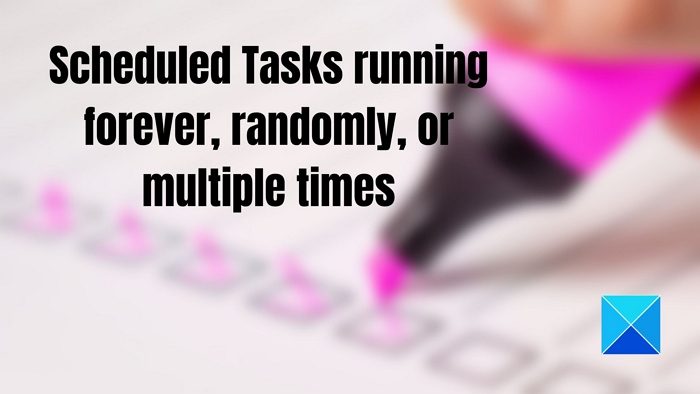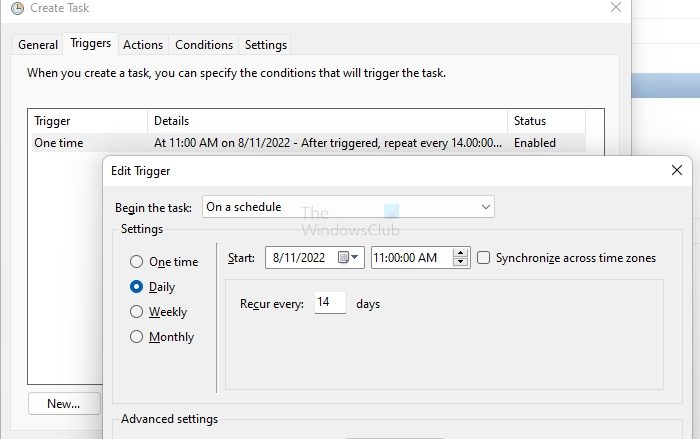Scheduled Tasks running forever, randomly, or multiple times
Follow these suggestions to ensure the scheduled tasks on Windows 11/10 are running as expected and not randomly. You will need admin permission to fix the problem.
1] Randomly: Switch from Weekly to Daily Recurrence
One of the suggestions was to switch to daily recurrence from weekly for repeating tasks. So instead of setting up weekly tasks, switch to a day-based trigger. So if you want to run a task every two weeks, set it to run every 14 days.
2] Multiple Times: Check if another program is triggering the task
System accounts can invoke user-created tasks as they have a higher privilege over user accounts. You need to check in the history section of the task if any of the other tasks are executing the command. While the chances are slim, it is still a possibility you should not ignore. If you notice that the history tab is disabled, you need to go back to Task Scheduler main screen and look for Enable All Tasks history in the right column.
Once you figure it out, you can check the permission setting of the task and remove the program from the list that is not supposed to run it.
3] Forever: Check the recurrence time, and end time. Delete and recreate tasks
Some tasks as been reported to run forever even though there is a specified end time. You need to check the recurrence and the end time to resolve this. If they haven’t expired, the only way out is to delete and recreate the task.
4] Add Multiple Trigger to run every fixed number of days
If switching to a daily or fixed number of days doesn’t work, the alternate method is to define multiple triggers to execute every fixed no of days and run indefinitely. If you need to run it every seven days, you can change it accordingly.
In this image, I have created a task that runs one time on a set date and time. Instead of setting daily or weekly, I created a trigger that runs every 14-days but with no expiration time. Instead of setting a daily or weekly task, use one time with the weekly trigger to keep things simple. You can also add multiple triggers if need be. This post will help you if the Task Scheduler triggers are not working. Looking at multiple reports, it feels that the Task Scheduler may have bugs that cause this. While there is a workaround, they make setting up tasks cumbersome. I hope the post was easy to follow, and you were able to fix the problem where the scheduled tasks kept running forever, randomly or multiple times.
Why are Tasks not running as scheduled?
If everything else is correct, you need to check if the Task Scheduler Service is set to run automatically or at Windows start. Go to Service Snapin, locate the service, and check if it’s stopped. If yes, you need to set it to Automatic. If the service is disabled, many system-based functions will stop working. Read: How to enable or disable Scheduled Task in Windows 11/10
What will happen if I delete all the tasks in the Task Scheduler?
First, you should not delete all the tasks, but if you do, most of them will be recreated by applications when they don’t find the task. However, it will happen only when you launch the application. That said, chances are that some of the tasks will not create it, and the only option is to reinstall or repair the program.


